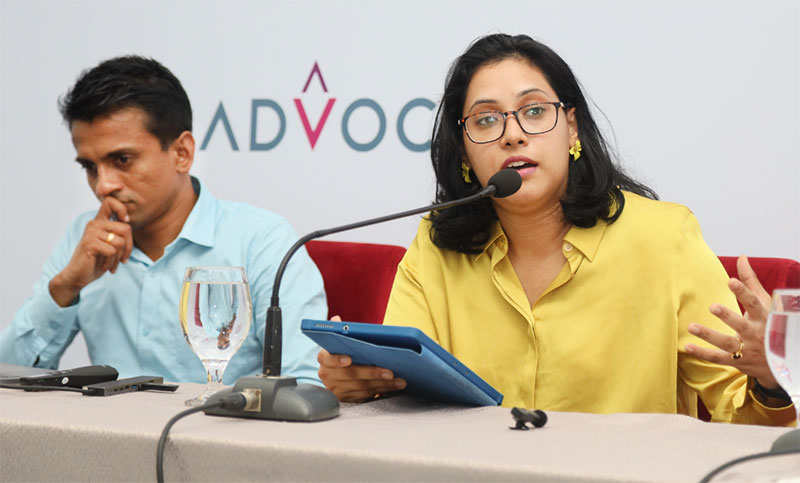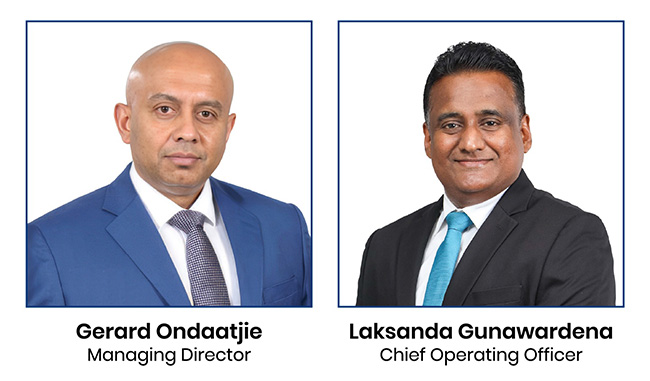Business
SOEs seen as failing SL’s ordinary citizens

By Ifham Nizam
State-Owned Enterprises (SOEs) in Sri Lanka have long served the interests of its employees and politicians, neglecting the welfare of ordinary citizens, Research Consultant at the Advocata Institute Rehana Thowfeek said.
Speaking at a recent media briefing titled, “Burden and The Urgency of State-Owned Enterprise Reform” held at the BMICH, Thowfeek emphasized the urgent need for reform, stating that despite Sri Lanka defaulting on its loan repayments for nearly two years, meaningful progress has been lacking in the country.
Thowfeek highlighted the detrimental impact state intervention in markets has on consumer welfare, attributing inefficiencies to the enrichment of politicians at the expense of taxpayers. She outlined recent reform efforts, including the passing of the SOE Reforms Act and a new Banking Act, alongside the establishment of the State-Owned Enterprise Restructuring Unit (SOERU) and the Holding Company.
However, she cautioned that the delay in addressing SOE issues poses a significant risk to Sri Lanka’s economic sustainability, noting that SOEs have become hotbeds of corruption.
CEO, Advocata Institute, Dhananath Fernando echoed these concerns, stressing the necessity for SOE reform, regardless of the upcoming election cycle. Highlighting the staggering losses incurred by key SOEs in 2022, he underscored the burden placed on taxpayers, estimating a cost of Rs. 1.7 million per registered taxpayer due to SOE mismanagement. Fernando emphasized the urgent need for restructuring, warning of worsening conditions for Sri Lankan citizens and taxpayers if action is not taken promptly.
Fernando added: ‘Despite ongoing reforms, progress has been sluggish, with reforms barely keeping pace to avert immediate crises rather than fostering long-term competitiveness. The International Monetary Fund’s recommendations, including the importance of the Holding Company and the need for skilled advisory board members, underscore the gravity of the situation.
‘Additionally, the cyclical nature of SOE debt, exemplified by Sri Lankan Airlines, poses a continuous threat to the government’s fiscal stability. Transparent divestment processes are essential to prevent further taxpayer exploitation, as politicization only exacerbates the issue.’
Financial journalist Shihar Aneez highlighted the costs of delays in reform, particularly evident in cases like Sri Lankan Airlines, where missed deadlines only escalate taxpayer burdens.
Aneez cautioned against misplaced trust in politicians’ promises, citing past failures to deliver on reform commitments. He further denounced the misuse of SOEs for political gain, noting that taxpayers foot the bill for SOE losses, which are exploited for electoral purposes.
In essence, he added that the urgent need for comprehensive SOE reform in Sri Lanka cannot be overstated, as continued inaction threatens the economic well-being of the nation’s citizens.
Business
Redefining Industry Standards: Home Lands Group Emerges as Sri Lanka’s Premier Force in Lifestyle and Developer Leadership

At a time when Sri Lanka’s property landscape is experiencing rapid transformation, one organisation continues to define the direction of the market through scale, innovation, and an unwavering commitment to quality. At the 2025 PropertyGuru Asia Property Awards (Sri Lanka), the Home Lands Group of Companies maintained its place at the peak of the industry, acquiring two of the most influential awards of the year: Best Developer for the Group and Best Lifestyle Developer for Home Lands Skyline (Private) Limited.
These distinctions signify more than just project-level success. They reflect the organisation’s leadership in shaping how Sri Lankans aspire to live, work, and invest.
The Home Lands Group has built a broad presence throughout Sri Lanka’s most active corridors, from the rapidly evolving suburbs of Colombo to the developing lifestyle hubs of Negombo, Malabe, and Kahathuduwa, guided by extensive market research. The Group has transformed its in-depth knowledge of the property market into a portfolio of assets embodying superior residential living experiences, supported by strategically located branches that deliver an integrated suite of real estate services for buyers nationwide.
Home Lands Skyline, the Group’s flagship development arm and the 2025 Best Lifestyle Developer, is responsible for this on-ground reach. The company was commended for shaping communities through visionary residential environments and for its ability to combine cutting-edge sustainability with expansive lifestyle amenities. With 19 completed projects, including the largest integrated golf community in Sri Lanka and nine sustainable developments, Home Lands Skyline keeps raising the bar for efficiency, design, and placemaking.
Both ambition and operational strength are evident in its recent accomplishments. The company completed a number of landmark projects such as Elixia 3C’s Apartments, Santorini Resort Apartments & Residencies, and the 1,200-unit Canterbury Golf Resort Apartments & Residencies, which has more than 50 resort amenities that meet international standards and the nation’s first day-and-night golf course. In addition, the Group’s remarkable 58% market share earned it the title of Sri Lanka’s Most Preferred Residential Real Estate Brand in the RIU Brand Health Survey.
This growth is supported by a sustainability-first philosophy. The company incorporates environmental responsibility into every stage of development, from modular construction, renewable energy integration, and ethical sourcing throughout its supply chain to passive design principles that improve natural light and ventilation. This dedication is demonstrated by its Platinum Award at the CIOB Green Awards 2024.
The Home Lands Group is at the forefront of creating new lifestyle expectations as demand for well-planned, resort-style communities rises. In addition to confirming past achievements, the Group’s 2025 victories at the PropertyGuru Asia Property Awards (Sri Lanka) indicate a trajectory of ongoing leadership, positioning it as a transformative force in the future of Sri Lankan real estate.
Business
Cheaper credit expected to drive Sri Lanka’s business landscape in 2026

The opening weeks of 2026 are offering a glimmer of cautious hope for the business community weary from years of economic turbulence and steep financing costs. The Central Bank’s latest weekly economic indicators signal more than just macroeconomic stability. They point to early signs of a long-awaited trend; a measurable dip in borrowing costs.
“If sustained, this shift could transform steady growth into a robust, investment-led expansion,” a senior economist told The Island Financial Review.
The benchmark Average Weighted Prime Lending Rate (AWPR) declined by 21 basis points to 8.98% for the week ending 16 January, according to the Central Bank.
“For entrepreneurs and CEOs, this is not just another statistic. It could mean the difference between postponing an expansion and hiring new staff. Across boardrooms, the hope is that this marks the start of a sustained downward trend that holds through 2026,” he said.
When asked about the instances where Treasury Bills are not fully subscribed by the investors, he replied,” Treasury Bill yields remained broadly stable, with only minimal movement across 91-day, 182-day, and 364-day tenors. Strong demand was clear, with the latest T-Bill auction oversubscribed by about 3.5 times. This sovereign-level stability creates room for the gradual easing of commercial lending rates, allowing the Central Bank to nurture a more growth-supportive monetary policy.”
Replying to a question on how he views the inflation numbers in this context, he said, “The year-on-year increase in the National Consumer Price Index stood at a manageable 2.4% in November, with core inflation at 2.2%. Such an environment should allow interest rates to fall without sparking a price spiral. For businesses, it means the real cost of borrowing adjusted for inflation, and it is becoming more favourable for them. While consumers still face weekly price shifts in vegetables and fish, the broader disinflation trend gives policymakers leeway to keep credit affordable.”
Referring to the growth trajectory, he mentioned, “With GDP growth provisionally at 5.4% in the third quarter of 2025 and Purchasing Managers’ Indices signalling expansion in both manufacturing and services, the economy is in a growth phase. However, to accelerate this momentum businesses need capital at lower cost to modernise machinery, boost export capacity, and spur innovation. Affordable credit is, therefore, not merely helpful, it is essential to shift growth into a higher gear.”
In conclusion , he said,” The coming months will be watched closely, because for Sri Lankan businesses, a sustained decline in borrowing costs isn’t just an indicator; it’s the foundation for growth. There’s hope that this easing in the cost of money will prevail through most of the year.”
By Sanath Nanayakkare ✍️
Business
Mercantile Investments expands to 90 branches, backed by strong growth

Mercantile Investments & Finance PLC has expanded its national footprint to 90 branches with a new opening in Tangalle, reinforcing its commitment to community accessibility. The trusted non-bank financial institution, with over 60 years of service, now supports diverse communities across Sri Lanka with leasing, deposits, gold loans, and tailored lending.
This physical expansion aligns with significant financial growth. The company recently surpassed an LKR 100 billion asset base, with its lending portfolio doubling to Rs. 75 billion and deposits growing to Rs. 51 billion, reflecting strong customer trust. It maintains a low NPL ratio of 4.65%.
Chief Operating Officer Laksanda Gunawardena stated the branch network is vital for building trust, complemented by ongoing digital investments. Managing Director Gerard Ondaatjie linked the growth to six decades of safeguarding depositor interests.
With strategic plans extending to 2027, Mercantile Investments aims to convert its scale into sustained competitive advantage, supporting both customers and Sri Lanka’s economic progress.
-

 Editorial2 days ago
Editorial2 days agoIllusory rule of law
-

 News3 days ago
News3 days agoUNDP’s assessment confirms widespread economic fallout from Cyclone Ditwah
-

 Business5 days ago
Business5 days agoKoaloo.Fi and Stredge forge strategic partnership to offer businesses sustainable supply chain solutions
-

 Editorial3 days ago
Editorial3 days agoCrime and cops
-

 Features2 days ago
Features2 days agoDaydreams on a winter’s day
-

 Editorial4 days ago
Editorial4 days agoThe Chakka Clash
-

 Features2 days ago
Features2 days agoSurprise move of both the Minister and myself from Agriculture to Education
-

 Features2 days ago
Features2 days agoThe Story of Furniture in Sri Lanka



















